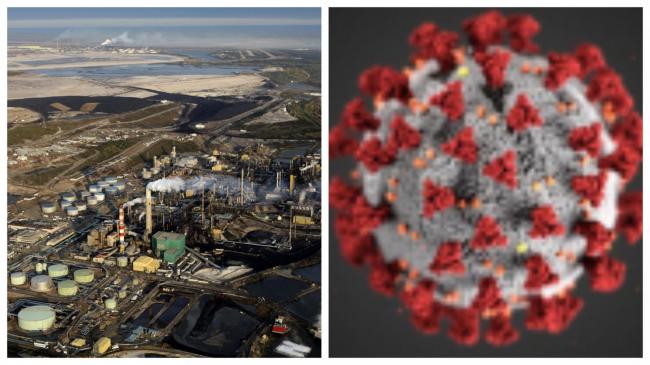Articles Menu

April 20th 2020
How far is too far?
It’s a question that’s been debated since the start of the COVID-19 pandemic, especially when Prime Minister Justin Trudeau eyed broader emergency powers for the federal government and left the door open to using cellphone data to track compliance with physical-distancing rules.
Most of the commentary in this vein has focused on rule of law, along with civil and political rights, such as privacy or the impacts of social distancing on freedom of association.
That’s part of the picture.
But we also need to talk about what’s unfolding in the background of the pandemic and whose rights are the object of concern. In this respect, exceptions to the rules that are meant to keep people safe are informative.
Industrial work camps, particularly those housing workers building pipeline projects, are one troubling exception to bans on large gatherings of people.
As of late March, construction was underway on contentious projects like the Coastal GasLink fracked natural gas pipeline in B.C. and the expanded Trans Mountain tar sands pipeline from Alberta to B.C. Hundreds of workers are currently living in camps supporting new energy projects, including 300 on Coastal GasLink — and that’s after companies have taken measures to send a chunk of workers home. On March 31 Alberta Premier Jason Kenney announced that construction on the Keystone XL pipeline will be charging ahead, with a billion-plus dollars in funding from the Alberta government.
It’s difficult to imagine how new fossil fuel infrastructure, like all of these pipelines, falls into the category of essential services, which are allowed to operate during the pandemic. In New Zealand, for example, exploratory drilling wasn’t considered essential. Exploring for oil, like building pipelines, isn’t necessary to maintain existing energy or electricity services.
Allowing construction to continue at this sensitive time casts doubt on politicians' promises of better support to Indigenous communities, which face social and health inequities that make them more vulnerable to COVID-19 — yet they have a history of being grossly underserved by colonial governments. Last week, the Assembly of First Nations raised concerns about communities being under resourced.
With this in mind, it’s perfectly reasonable that Indigenous leaders in B.C. have called for a stop to Coastal GasLink construction, citing the risk that work camps might bring the virus into the local community. It’s a risk that the former chief medical officer for B.C.’s northern health authority underscored in a recent open letter, where he called work camps “land-locked cruise ships” and “COVID-19 incubators placing the workers, the host communities, and the home communities of the workers at unacceptable risk.”
The recent confirmation of a COVID-19 case at Kitimat’s LNG Canada plant and an ongoing legal case by Wet’suwet’en hereditary chiefs against the Coastal GasLink pipeline that raises additional safety concerns about work camps are two more reasons to halt construction now, and to ensure emergency compensation and livelihood support for affected workers.
"Big companies and wealthy executives have a history of taking advantage of crises, from lobbying for government bailouts to rushing projects through at a time when the public’s ability to engage in the decision-making process is severely limited."
An equitable pandemic response requires an end to “corporate exceptionalism,” as the Union of British Columbia Indian Chiefs recently termed it. After all, the Wet’suwet’en Nation postponed an all-clans meeting to decide on the land title proposal which hereditary chiefs and federal officials agreed to in the wake of nationwide solidarity protests against Coastal GasLink.
Surely, if the Wet’suwet’en Nation can put matters of Indigenous sovereignty on pause for the sake of public health, Canadian governments and companies can show the same responsibility and respect.
While the rest of Canada is being urged to do everything they can to “flatten the curve” and protect one another, oil and gas pipeline companies operating in Indigenous communities should be no exception. Rural Indigenous communities should be afforded every bit of the caution extended to white, urban, and middle-class centres.
The precautionary principle holds that it is better to be safe than sorry. It is a recognized legal principle usually applied in the environmental protection context. Our social responsibility to protect the public from harm when a plausible risk exists should extend to the human rights and public health considerations here.
Big companies and wealthy executives have a history of taking advantage of crises, from lobbying for government bailouts to rushing projects through at a time when the public’s ability to engage in the decision-making process is severely limited.
This time around, executives need to play by the same rules as the rest of us. Corporations have no inherent right to a free pass on public health guidelines in order to make a profit or to meet tight construction timelines. However, governments are required to protect the public and respect Indigenous rights.
That is essential.
No exceptions.
[Top photos: Alberta oil sands. Photograph by Andrew S. Wright. / Image of the novel coronavirus]